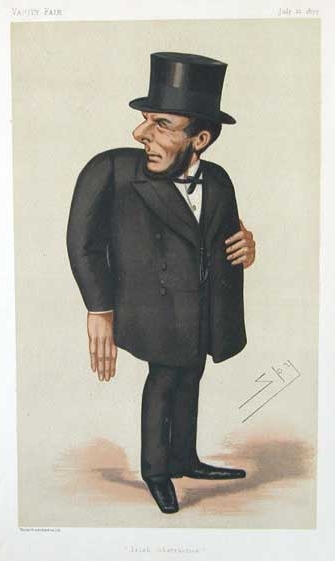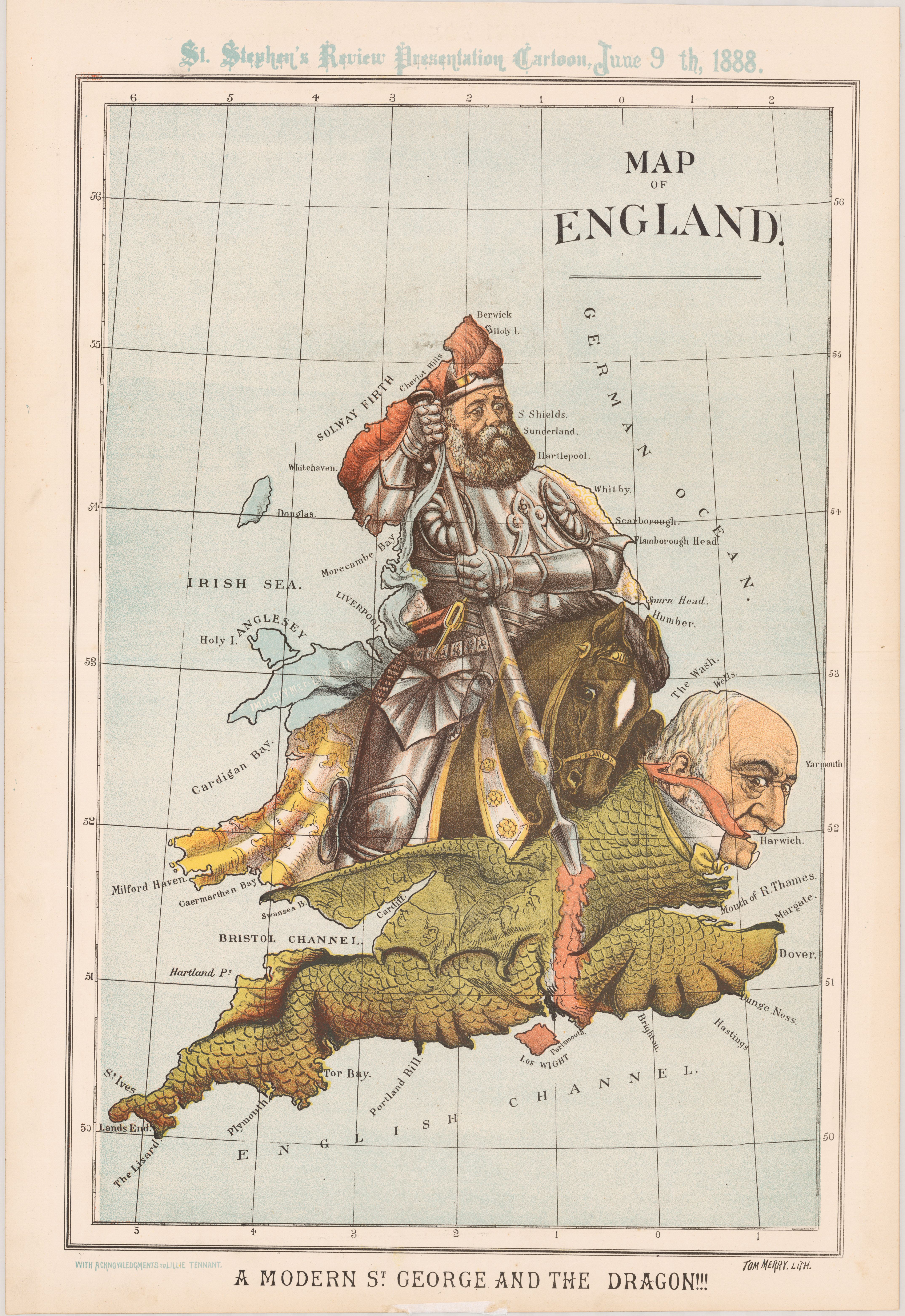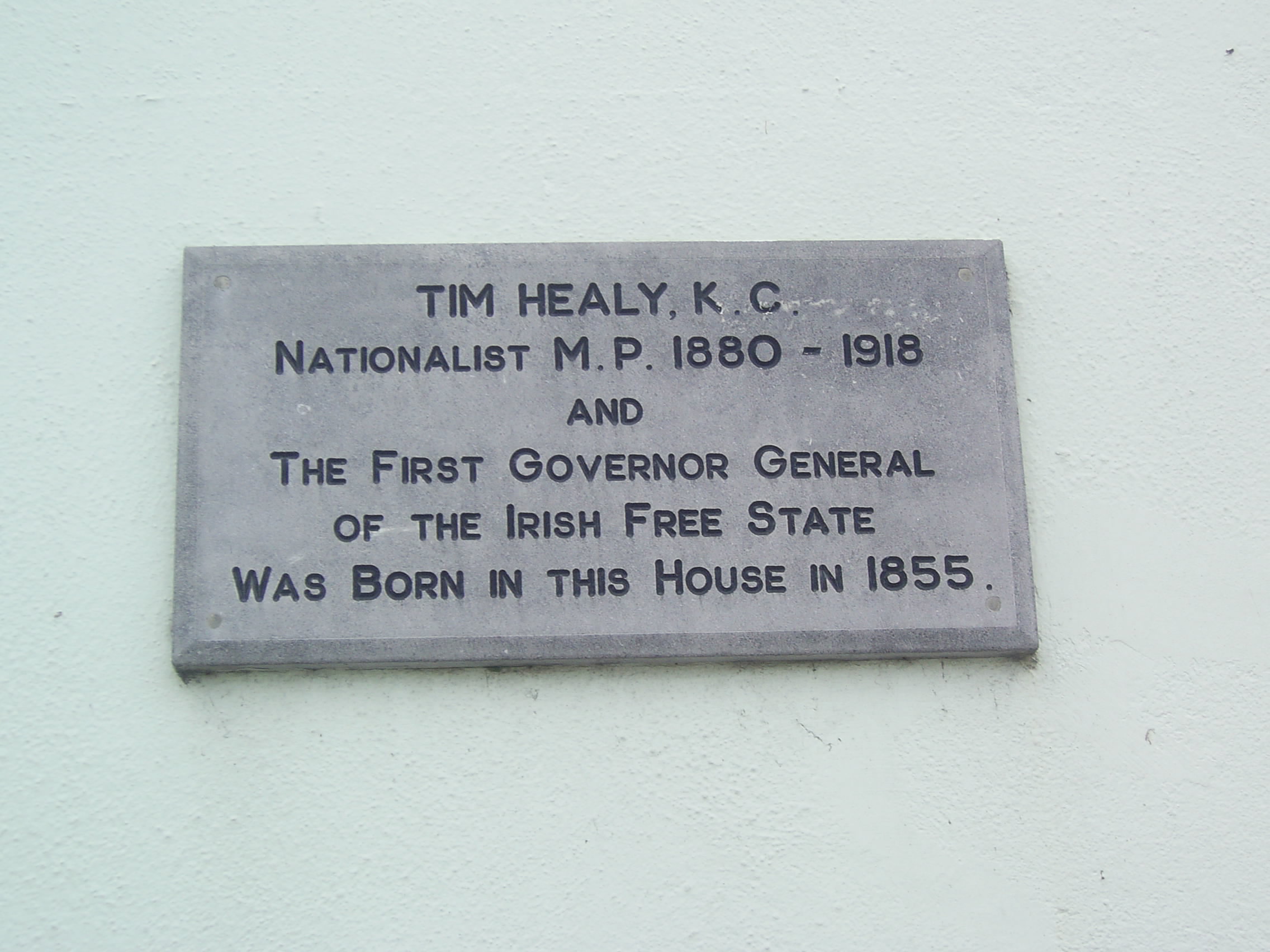|
1886 Galway Borough By-election
The 1886 Galway Borough by-election was a parliamentary by-election held for the United Kingdom House of Commons constituency of Galway Borough on 11 February 1886. The seat had been won by T. P. O'Connor of the Irish Parliamentary Party in the general election of 1885, but having been elected also in Liverpool Scotland, he chose to sit for the latter. The Galway seat thus became vacant, requiring a by-election. Background It appeared at first that this would be a straightforward matter. The Times reported on 4 February that Dr O'Connor, brother of the East Donegal MP Arthur O'Connor, would stand for selection as Irish Parliamentary Party candidate, along with a Mr Doherty from Dublin. It was expected that the nominated candidate would be unopposed in the by-election. Two days later, however, the paper announced a development. William O'Shea, formerly a Home Rule MP for Clare, and who had narrowly been defeated in the general election as a candidate for the Liberal party in L ... [...More Info...] [...Related Items...] OR: [Wikipedia] [Google] [Baidu] |
By-election
A by-election, also known as a special election in the United States and the Philippines, a bye-election in Ireland, a bypoll in India, or a Zimni election (Urdu: ضمنی انتخاب, supplementary election) in Pakistan, is an election used to fill an office that has become vacant between general elections. A vacancy may arise as a result of an incumbent dying or resigning, or when the incumbent becomes ineligible to continue in office (because of a recall, election or appointment to a prohibited dual mandate, criminal conviction, or failure to maintain a minimum attendance), or when an election is invalidated by voting irregularities. In some cases a vacancy may be filled without a by-election or the office may be left vacant. Origins The procedure for filling a vacant seat in the House of Commons of England was developed during the Reformation Parliament of the 16th century by Thomas Cromwell; previously a seat had remained empty upon the death of a member. Cromwell de ... [...More Info...] [...Related Items...] OR: [Wikipedia] [Google] [Baidu] |
Joseph Biggar
Joseph Gillis Biggar (c. 1828 – 19 February 1890), commonly known as Joe BiggarD.D. Sheehan, Ireland Since Parnell', London: Daniel O'Connor, 1921. or J. G. Biggar, was an Irish nationalist politician from Belfast. He served as an MP in the House of Commons of the United Kingdom of Great Britain and Ireland as member of the Home Rule League and later Irish Parliamentary Party for Cavan from 1874 to 1885 and West Cavan from 1885 to his death in 1890. Origins He was the eldest son of Joseph Bigger, merchant and chairman of the Ulster bank, by Isabella, daughter of William Houston of Ballyearl, Antrim. He was educated at the Belfast Academy, and, entering his father's business of a provision merchant, became head of the firm in 1861, and carried it on till 1880. His parents were Presbyterians, but Biggar was in 1877 received into the Roman Catholic Church. His surname was originally spelled Bigger, but he changed the spelling upon conversion and taking up his political caree ... [...More Info...] [...Related Items...] OR: [Wikipedia] [Google] [Baidu] |
By-elections To The Parliament Of The United Kingdom In County Galway Constituencies
A by-election, also known as a special election in the United States and the Philippines, a bye-election in Ireland, a bypoll in India, or a Zimni election (Urdu: ضمنی انتخاب, supplementary election) in Pakistan, is an election used to fill an office that has become vacant between general elections. A vacancy may arise as a result of an incumbent dying or resigning, or when the incumbent becomes ineligible to continue in office (because of a recall, election or appointment to a prohibited dual mandate, criminal conviction, or failure to maintain a minimum attendance), or when an election is invalidated by voting irregularities. In some cases a vacancy may be filled without a by-election or the office may be left vacant. Origins The procedure for filling a vacant seat in the House of Commons of England was developed during the Reformation Parliament of the 16th century by Thomas Cromwell; previously a seat had remained empty upon the death of a member. Cromwell devi ... [...More Info...] [...Related Items...] OR: [Wikipedia] [Google] [Baidu] |
1886 Elections In The United Kingdom
Events January–March * January 1 – Upper Burma is formally annexed to British Burma, following its conquest in the Third Anglo-Burmese War of November 1885. * January 5– 9 – Robert Louis Stevenson's novella ''Strange Case of Dr Jekyll and Mr Hyde'' is published in New York and London. * January 16 – A resolution is passed in the German Parliament to condemn the Prussian deportations, the politically motivated mass expulsion of ethnic Poles and Jews from Prussia, initiated by Otto von Bismarck. * January 18 – Modern field hockey is born with the formation of The Hockey Association in England. * January 29 – Karl Benz patents the first successful gasoline-driven automobile, the Benz Patent-Motorwagen (built in 1885). * February 6– 9 – Seattle riot of 1886: Anti-Chinese sentiments result in riots in Seattle, Washington. * February 8 – The West End Riots following a popular meeting in Trafalgar Square, London. * Februa ... [...More Info...] [...Related Items...] OR: [Wikipedia] [Google] [Baidu] |
Conservative Central Office
The Conservative Campaign Headquarters (CCHQ), formerly known as Conservative Central Office (CCO), is the headquarters of the British Conservative Party, housing its central staff and committee members, including campaign coordinators and managers. As of 25th October 2022, Nadhim Zahawi is the Chairman of the Conservative Party. Campaigning CCHQ is responsible for all campaigning of the Conservative Party, though it delegates responsibility for local campaigns to constituency Conservative Associations. It maintains overall responsibility for targeting voters and seats, including shortlisting and finalising the selection of Conservative candidates across the United Kingdom for local and national elections. CCHQ is used as a phone bank for volunteers, and is most active at general elections and some by-elections. The CCHQ Voter Communications Team also coordinates and manages data from local Conservative call centres. Following the 2017 general election in which the Conservativ ... [...More Info...] [...Related Items...] OR: [Wikipedia] [Google] [Baidu] |
Government Of Ireland Bill 1886
The Government of Ireland Bill 1886, commonly known as the First Home Rule Bill, was the first major attempt made by a British government to enact a law creating home rule for part of the United Kingdom of Great Britain and Ireland. It was introduced on 8 April 1886 by Liberal Prime Minister William Gladstone to create a devolved assembly for Ireland which would govern Ireland in specified areas. The Irish Parliamentary Party under Charles Stewart Parnell had been campaigning for home rule for Ireland since the 1870s. The bill, like his Irish Land Act 1870, was very much the work of Gladstone, who excluded both the Irish MPs and his own ministers from participation in the drafting. Following the Purchase of Land (Ireland) Act 1885 it was to be introduced alongside a new Land Purchase Bill to reform tenant rights, but the latter was abandoned. Alvin Jackson, ''Home Rule: An Irish History 1800—2000'' Key aspects The key aspects of the 1886 bill were: Legislative * A unicamera ... [...More Info...] [...Related Items...] OR: [Wikipedia] [Google] [Baidu] |
Katharine O'Shea
Katharine Parnell (née Wood; 30 January 1846 – 5 February 1921), known before her second marriage as Katharine O'Shea, and usually called Katie O'Shea by friends and Kitty O'Shea by enemies, was an English woman of aristocratic background whose decade-long secret affair with Charles Stewart Parnell led to a widely publicized divorce in 1890 and his political downfall. Background Katharine was born in Braintree, Essex, on 30 January 1846, the daughter of Sir John Page Wood, 2nd Baronet (1796–1866), and granddaughter of Sir Matthew Wood, a former Lord Mayor of London. She had an elder brother who became Field Marshal Sir Evelyn Wood and was also the niece of both Western Wood MP (1804–1863) and Lord Hatherley, Gladstone's first Liberal Lord Chancellor. Relationship with Parnell In 1867, Katharine married Captain William O'Shea, a Catholic Nationalist MP for County Clare from whom she separated around 1875. Katharine first met Parnell in 1880 and began an affair wi ... [...More Info...] [...Related Items...] OR: [Wikipedia] [Google] [Baidu] |
Whigs (British Political Party)
The Whigs were a political faction and then a political party in the Parliaments of England, Scotland, Ireland, Great Britain and the United Kingdom. Between the 1680s and the 1850s, the Whigs contested power with their rivals, the Tories. The Whigs merged into the new Liberal Party with the Peelites and Radicals in the 1850s, and other Whigs left the Liberal Party in 1886 to form the Liberal Unionist Party, which merged into the Liberals' rival, the modern day Conservative Party, in 1912. The Whigs began as a political faction that opposed absolute monarchy and Catholic Emancipation, supporting constitutional monarchism with a parliamentary system. They played a central role in the Glorious Revolution of 1688 and were the standing enemies of the Roman Catholic Stuart kings and pretenders. The period known as the Whig Supremacy (1714–1760) was enabled by the Hanoverian succession of George I in 1714 and the failure of the Jacobite rising of 1715 by Tory rebels. The Whig ... [...More Info...] [...Related Items...] OR: [Wikipedia] [Google] [Baidu] |
Timothy Michael Healy
Timothy Michael Healy, KC (17 May 1855 – 26 March 1931) was an Irish nationalist politician, journalist, author, barrister and a controversial Irish Member of Parliament (MP) in the House of Commons of the United Kingdom of Great Britain and Ireland. His political career began in the 1880s under Charles Stewart Parnell's leadership of the Irish Parliamentary Party (IPP) and continued into the 1920s, when he was the first governor-general of the Irish Free State. Family background He was born in Bantry, County Cork, the second son of Maurice Healy, clerk of the Bantry Poor Law Union, and Eliza (née Sullivan) Healy. His elder brother, Thomas Healy (1854–1924), was a solicitor and Member of Parliament (MP) for North Wexford and his younger brother, Maurice Healy (1859–1923), with whom he held a lifelong close relationship, was a solicitor and MP for Cork City. His father was descended from a family line which in holding to their Catholic faith, lost their lands, whi ... [...More Info...] [...Related Items...] OR: [Wikipedia] [Google] [Baidu] |
Charles Stewart Parnell
Charles Stewart Parnell (27 June 1846 – 6 October 1891) was an Irish nationalist politician who served as a Member of Parliament (MP) from 1875 to 1891, also acting as Leader of the Home Rule League from 1880 to 1882 and then Leader of the Irish Parliamentary Party from 1882 to 1891. His party held the balance of power in the House of Commons during the Home Rule debates of 1885–1886. Born into a powerful Anglo-Irish Protestant landowning family in County Wicklow, he was a land reform agitator and founder of the Irish National Land League in 1879. He became leader of the Home Rule League, operating independently of the Liberal Party, winning great influence by his balancing of constitutional, radical, and economic issues, and by his skillful use of parliamentary procedure. He was imprisoned in Kilmainham Gaol, Dublin, in 1882, but he was released when he renounced violent extra-Parliamentary action. The same year, he reformed the Home Rule League as the Irish Parliamen ... [...More Info...] [...Related Items...] OR: [Wikipedia] [Google] [Baidu] |
United Kingdom Constituencies
In the United Kingdom (UK), each of the electoral areas or divisions called constituencies elects one member to the House of Commons. Within the United Kingdom there are five bodies with members elected by electoral districts called "constituencies" as opposed to " wards": * The House of Commons (see Constituencies of the Parliament of the United Kingdom) * The Scottish Parliament (see Scottish Parliament constituencies and regions) * The Senedd (see Senedd constituencies and electoral regions) * The Northern Ireland Assembly (see Northern Ireland Assembly constituencies) * The London Assembly (see List of London Assembly constituencies) Between 1921 and 1973 the following body also included members elected by constituencies: * The Parliament of Northern Ireland (see Northern Ireland Parliament constituencies) Electoral areas called constituencies were previously used in elections to the European Parliament, prior to the United Kingdom's exit from the European Union (see Europe ... [...More Info...] [...Related Items...] OR: [Wikipedia] [Google] [Baidu] |
Liverpool Exchange (UK Parliament Constituency)
Liverpool Exchange was a borough constituency within the city of Liverpool in England, centred on Liverpool Exchange railway station. It returned one Member of Parliament (United Kingdom), Member of Parliament (MP) to the House of Commons of the United Kingdom, House of Commons of the Parliament of the United Kingdom, elected by the first past the post system. The constituency was created under the Redistribution of Seats Act 1885 for the 1885 United Kingdom general election, 1885 general election. It was abolished for the February 1974 United Kingdom general election, February 1974 election, when it was merged with Liverpool Scotland (UK Parliament constituency), Liverpool Scotland to form Liverpool Scotland Exchange (UK Parliament constituency), Liverpool Scotland Exchange. Boundaries The constituency covered the centre of the city of Liverpool, bordering on the River Mersey. It included the commercial area of the city, as well as poorer housing. It originally consisted of ... [...More Info...] [...Related Items...] OR: [Wikipedia] [Google] [Baidu] |






_Irish_Frankenstein.jpg)
